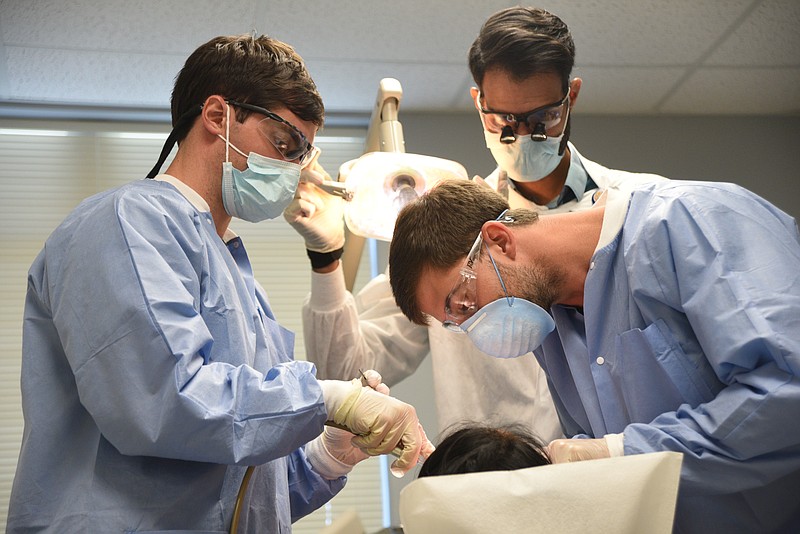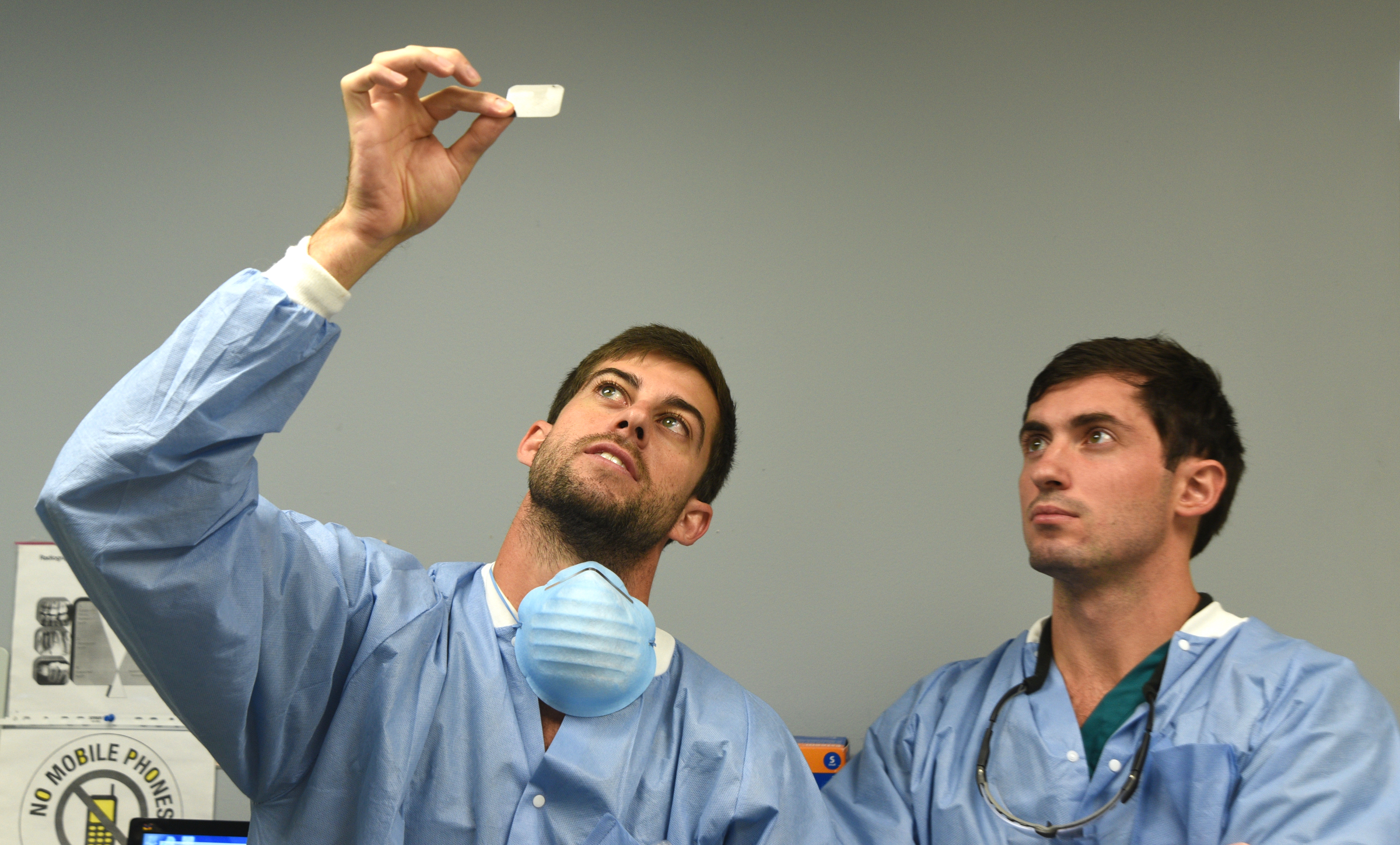IF YOU GO
› Where: Dodson Avenue Community Health Center› Where: 1200 Dodson Ave., Chattanooga› Hours: 8:30 a.m.-5 p.m., Monday-Friday› Contact: 423-778-2800
The head of UT's dental school is hopeful a new clinic staffed by dental students in Chattanooga will help convince newly graduated dentists to donate some of their time to those who can't afford dental care.
"When these same students go out to practice in the affluent suburbs, I hope they will donate a certain amount of time every month to people who don't have the finances to see a [dental] practitioner," said Timothy L. Hottel, dean of the University of Tennessee College of Dentistry.
Two fourth-year students from the Memphis-based dental school will work for two weeks at a time in the dental clinic at the Dodson Avenue Neighborhood Health Center, managed by Erlanger hospital.
Fourth-year students Michael Fesmire and Cale Atteberry began work at the clinic last week, under the supervision of two full-time staff dentists, doing cleanings, fillings and pulling teeth.
Fesmire, of Hendersonville, Tenn., said patients will get quality care even though he has not yet graduated. All third-year students at the dental school work in a clinic in Memphis, so "all of us have had at least a year of treating patients," he said.
The Chattanooga program, which began Sept. 12, is part of a plan to expand the reach of the dental school across the state, Hottel said. The school already operates clinics in Union City, Jackson and Bristol, with one set to open in Nashville next year and in Knoxville the year after that.
Hottel has no illusions that recent graduates will practice full time in low-income communities. With many graduates facing $350,000 in college and dental school debt, "they can't afford to go to an impoverished area and treat people for free or with the reimbursement you get from the federal government," he said.
"Our goal here is to get every one of them to donate a day a month," Hottel said.
Dentist Dr. Aparnaa Upadhyaya, who supervises the dental clinic, said the additional help from the dental school is needed.
"Access is a big problem for the state," said Upadhyaya, who staffers call "Dr. U."
While, in general, dental care doesn't get as much attention as health care, there are similar problems with expensive care and a lack of access for low-income adults who have no dental insurance. Adults are not covered by Medicaid in Tennessee, except for pregnant women.
The good news: affordable dental care for children has been growing in Tennessee.
In 2000, only 29 percent of all the children in the state covered by Medicaid had a visit to a dentist, compared to 55 percent of those who had private insurance coverage, according to the American Dental Association. By 2013, 53 percent of those covered by Medicaid in the state saw a dentist, almost as high as the 56 percent who had private insurance.
Dental health is particularly important for children, according to Dr. Andy Thomas, who oversees four dental clinics run by the Chattanooga-Hamilton County Health Department.
"We're really concerned about these kids who have trouble eating because of dental problems," he said, "or sleeping because they are in pain. Or they go to school and they can't learn well because they are in pain."
According to DentaQuest, the organization the state contracts with to manage dental care for children under the state's TennCare program, 810,000 children had access to dental coverage in 2015, up 60,000 from the previous year.
Using data supplied by the state, DentaQuest matches children with a local dentist who has agreed to accept Medicaid payments.
"Sometimes you don't know where to go or you are under the impression that you have no place to go," said Michele Blackwell, vice president for the Southeast Region for DentaQuest. "We ensure every child has a dental home."
The goal is to prevent problems before they become serious, Blackwell said.
"We can monitor claims data to see who is getting care," she said. "We want them to get preventive care, so they don't need as many repair services that are costly for taxpayers."
To do that, DentaQuest spends a lot of time convincing parents to use dental services.
"Their problem may be a lack of transportation, or a lack of knowledge that they even have benefits," Blackwell said. "We reach out via phone, and by mail as well. The phone is often more effective because we can offer on the spot for them to make an appointment."
Winning over the parents is key to improving the children's care.
"If adults are getting the care, it sets an example for the household of the kids getting it," said the Dodson clinic's Upadhyaya.
There are negative signs for children - between 2003 and 2013, the amount of money the state pays to reimburse dentists for participating in the TennCare program for children declined by 37.5 percent, compared to what they would have been paid in the open market, according to the American Dental Association. The percentage of dentists who accepted TennCare funds to treat children was only 35 percent in 2014, below the national average of 42 percent.
But for adults, the future looks much less rosy.
TennCare does not cover adults for dental care, and the rising cost of health care, which consumers are seeing in much larger deductibles in their policies, is affecting dental care.
"Dental coverage is always second fiddle to medical coverage," said UT's Hottel. "The deductibles - especially in the current plans mandated by the federal government - are extremely high."
As a result, many people avoid getting dental care except in an emergency.
In a recent analysis, the Pew Charitable Trust concluded the "erosion of private and public dental insurance, mounting costs of care and a limited number of dentists who accept public coverage have fueled a drop in utilization by working-age adults. The incidence of working-age adults seeking dental care in hospital emergency rooms has risen over the past decade."
Erlanger hospital's emergency room now sees a steady stream of about 60 dental patients a month, but is not staffed to provide dental services. Instead, the emergency room staff can stabilize a patient and give them medication to stop infection, but then must refer them elsewhere.
While there are clinics that provide dental services at rates based on adults' ability to pay, there are only a handful and very few at all in rural areas.
In the Chattanooga area, for example, there is the Dodson Avenue clinic - where UT's dental school is now assigning its residents - which has 10 dental chairs staffed by two full-time dentists and a four-person support staff.
"We offer a sliding fee scale that depends on household income," Upadhyaya said. "That makes it affordable for the services we offer."
In addition, there are the four clinics managed by the county health department. But the health department clinics focus on children and only offer limited services to adults.
"TennCare does not pay for dental beyond the age of 21," Thomas said. "In our clinic, we do see adults for an emergency. But there's a need for adults."
The one exception is the health department's Homeless Health Care Center on 11th Street, where a dentist is available two days a week.
The only other facility available is the Dr. Roy Clinic - named after the previous medical director of the clinic - run by Hope for the Inner City. It is staffed with volunteer dentists recruited by the Chattanooga Area Dental Society.
Dentists emphasize that while they only deal with teeth and gums, the mouth is inextricably linked to the rest of the body for health issues.
"If you end up losing your teeth, you can't chew food, and you are not getting energy," said Dr. Srikar Vulugundam, who works with Upadhyaya at the Dodson Avenue clinic. "The head is connected to the body, and it will affect their general well-being."
But too many people wait too late, until a problem gets out of hand, before seeking care.
"We tell them: 'You won't go to the emergency room if these are taken care of before you get to the point where it can't be addressed,'" Upadhyaya said.
And good dental care can make a big difference in their overall physical and mental health.
"Having a beautiful smile - sometimes bleeding gums get in the way of someone feeling they can do something better in their life," Upadhyaya said. "Sometimes some things we can do in their mouth go a long way toward improving their quality of life."
Contact staff writer Steve Johnson at 423-757-6673, sjohnson@timesfreepress.com, on Twitter @stevejohnsonTFP, and on Facebook, www.facebook.com/noogahealth.

